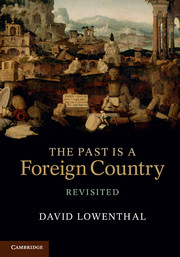Book contents
- Frontmatter
- Table of Contents
- List of illustrations
- List of permissions
- Acknowledgements
- List of abbreviations
- Introduction
- Part I Wanting the past
- 1 Nostalgia: dreams and nightmares
- 2 Time travelling
- 3 Benefits and burdens of the past
- Part II Disputing the past
- Part III Knowing the past
- Part IV Remaking the past
- Select bibliography
- Index
- References
1 - Nostalgia: dreams and nightmares
from Part I - Wanting the past
Published online by Cambridge University Press: 05 November 2015
- Frontmatter
- Table of Contents
- List of illustrations
- List of permissions
- Acknowledgements
- List of abbreviations
- Introduction
- Part I Wanting the past
- 1 Nostalgia: dreams and nightmares
- 2 Time travelling
- 3 Benefits and burdens of the past
- Part II Disputing the past
- Part III Knowing the past
- Part IV Remaking the past
- Select bibliography
- Index
- References
Summary
There once was a place where neighbors greeted neighbors in the quiet of summer twilight. Where children chased fireflies. And porch swings provided easy refuge … Remember that place? Perhaps from your childhood … That place is here again, in a new town called Celebration … that takes you back to that time of innocence … A place of caramel custard and cotton candy, secret forts and hopscotch on the streets … A whole new kind of lifestyle that’s not new at all – just lost for a while. That fellow who said you can’t go home again? He was wrong. Now you can come home.
Disney brochures, 1995Nostalgia is like a grammar lesson. You find the present tense, but the past perfect.
Everything is nostalgia. Everyone wants to live in the past. The present has no style. The present is ugly. The present is gross … It’s part of the human condition to look to the past, because if you look to the future you have to look forward to your own death … So the past is where we all want to be.
Jonathan Ames, 2005Nostalgia is today’s favoured mode of looking back. It saturates the press, serves as advertising bait, merits sociological study, expresses modern malaise. Obsolescence confers instant bygone status – no sooner is the fire engine retired than it becomes a precious relic. ‘Bring back proper kiosks’, yearned an English nostalgist. ‘Bring back trolley-buses … Bring back cars with starting handles.’ A Britain addicted to Victorian chivalry, neo-Gothic architecture, and the film Excalibur, surmised a 1981 critic, would ‘soon be appointing a Curator instead of a Prime Minister’. British curators are treasures in their own right, their heritage expertise exported worldwide, while at home Brideshead Revisited redux became Downton Abbey, today’s Edwardian triumph. Nostalgia ‘harks back to some rose-tinted past, of Marmite and The Magic Roundabout [1965–77], when kids played in the street, it was summer all year round, and Edrich was always 103 not out’. And before Britain’s imperial decline. ‘We’re going back to the past’, James Bond tells M in Skyfall, ‘where we have the advantage.
- Type
- Chapter
- Information
- The Past Is a Foreign Country – Revisited , pp. 31 - 54Publisher: Cambridge University PressPrint publication year: 2015
References
- 1
- Cited by

